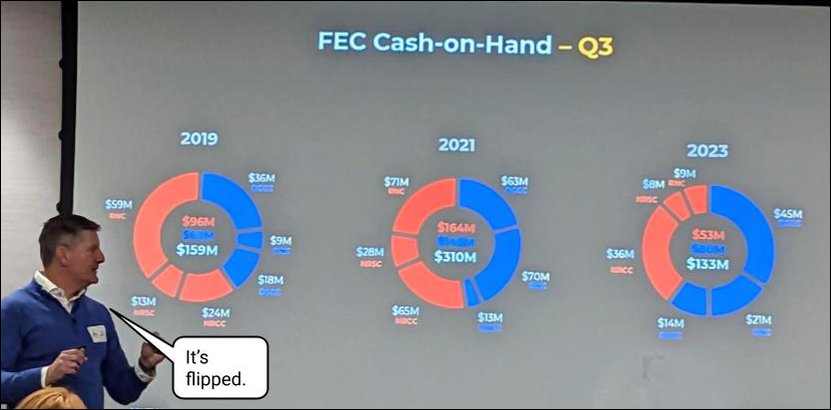
At a time when U.S. ad forecasters are beginning
to rethink the magnitude of 2023 political ad spending, there is one category that has become a surprising boon, especially for local and digital media in key states: reproductive rights ballot
initiatives.
"It could be $500 million just right there," Kyle Roberts, founder and CEO of political -- as well as general market -- ad tracker AdImpact told a roomful of station reps
gathered in New York City late Wednesday to hear his latest revisions for 2023 and 2024 political ad spending.
He was pointing to a slide presentation showing 11 states likely to have reproductive
rights initiatives on their ballots next year.
Even so, Roberts estimated "it could be half a billion dollars" in incremental political ad spending supporting both sides of the states where it
does reach the ballot.
advertisement
advertisement
And he wasn't just putting a finger in the air when he said that, because the slide he presented immediately before it showed what happened to political ad spending in
Ohio as a result of a state Amendment and reproductive ballot initiative in which voters enshrined Ohio women's right to choose in their state Constitution.
"This was a $70 million campaign,
just on reproductive rights -- in Ohio. That was pretty big," Roberts explained, calling the Supreme Court's Dobbs decision as fundamental an impact on the political advertising marketplace as the
Supreme Court's Citizens United decision was back in 2010.
Adding fuel to the media-spending fire, Roberts noted that several of the potential reproductive-rights ballot states also will be
so-called "swing states" in the general election -- creating a double whammy of political ad messaging that he predicted could be "pretty combustible in terms of ad dollars."
"There is a
significant amount of cash there," he emphasized, adding: "This issue is not going away, as we all know."
"If I'm a seller in this room, I am watching what's happening with abortion rights in
my state to find out if anything is going to hit the ballot, because that could drive significant dollars," Roberts told the reps.
As polarizing as that could prove for U.S. politics, it's a
good thing for the U.S. ad economy, because Roberts also noted that political ad spending is one of the few categories where "more money is coming in" during a slowdown and possible ad recession.
That said, Roberts conceded that 2023 "odd-year" spending so far has been a bit underwhelming, and is actually about $90 million off 2021's record $1.3 billion on odd-year spending.
Roberts
attributed that slowdown to a variety of factors, including the fact that Republican primary spending has not manifested in the way it had been predicted, including one dominant candidate and
lackluster spending by challengers.
He cited Tim Scott's pullout, which takes an estimated $11.5 million political ad budget out of the market, and the fact that neither Vivek Ramaswamy
or Nikki Haley have spent the millions of ad dollars they had been projected to spend -- so far.
But the biggest slowdown in political ad spending, he said, has been coming from ad spending
that would have been come from "low-dollar fundraising initiative," especially for down-ballot candidates this year, although he predicted it was something to keep an eye on for the general election
next year, as well.
One candidate likely to generate significant low-dollar fundraising, he said, already is the leading Republican candidate: the twice-impeached former president.
That said, Roberts also predicted another boon in political ad spending would come from the other side, noting, "The anti-Trump money is going to be huge," adding: "He's the best thing, really, for
the business."
In terms of how things stand currently vis a vis the political "cash-on-hand" between the two major parties, Roberts showed data putting Democrats in a more advantageous
position heading into 2024, which is a role reversal from the same point leading into the 2020 presidential election, when Republicans had a stronger cash position.
"It's flipped," he said,
citing the low-dollar fundraising among Republican candidates in particular.
